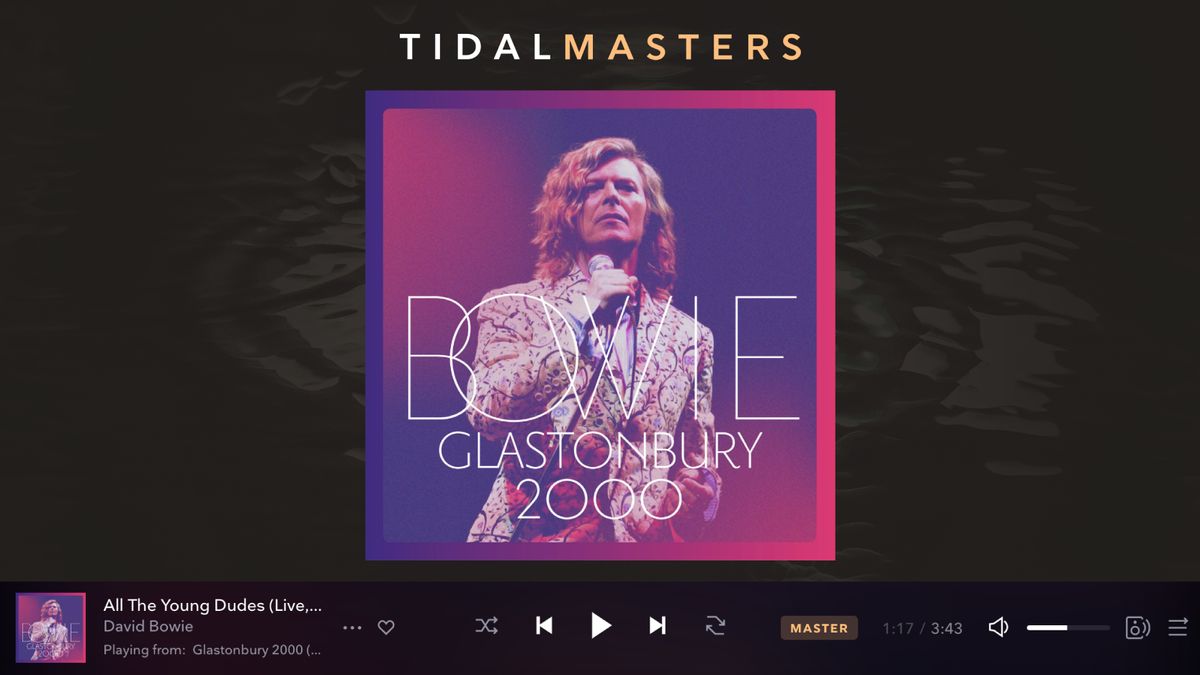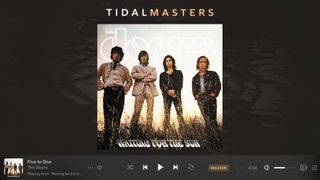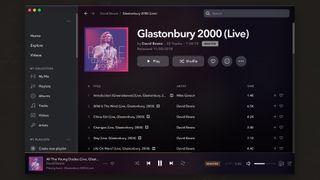Hear the difference: tracks to try with MQA

Music fans are missing out on incredible sound. You're missing out on incredible sound. It's a sad truth that most music listening experiences don't allow you to hear songs the way they were recorded; experience songs the way the artist intended.
Master Quality Authenticated (MQA) technology guarantees you get the whole picture – every instrument, every note, every syllable; the rhythm, the vocal emotion. It connects you with the sound and soul of artists you love.
While standard audio formats, like MP3, compress music into small file sizes and consequently discard up to 90 per cent of its information, MQA captures 100 per cent of a studio recording and delivers every painstakingly engineered, nitty-gritty detail all the way down the chain, from the studio to your ears. So when you listen to your favourite artist, it's like you are there, with them in the recording studio.
MQA music can be found on streaming services like Tidal and nugs.net, ready to enjoy however and wherever you choose – at home, in your car or on the move; straight from your phone, laptop or audio system.
Since arriving on the scene in 2015, Tidal has been a higher quality alternative to Spotify and Apple Music, for anyone who, like you, cares about music quality. Techradar says Tidal sounds "brilliant… you'll easily notice the difference compared to lower-quality formats." And, largely, that's the work of MQA technology.
MQA furnishes Tidal's catalogue with master-quality streams - dubbed Tidal Masters - for subscribers of the service's Hi-Fi tier to enjoy at no extra cost. These MQA-powered recordings can be experienced in all their high-quality glory straight from the Tidal desktop, Android and iOS apps. Or, to be heard in their maximum possible quality, they can be played through an MQA-ready product such as an Astell&Kern or Sony portable music player, LG G8 ThinQ smartphone or AudioQuest DragonFly Cobalt portable DAC.
Tidal Masters are dead-easy to find thanks to comprehensive playlist curation and labelling. And when you're ready to hit 'play' on your chosen track or album, be prepared to hear details you've never heard before. Because with Tidal Master streams, sound quality isn't a trade-off for convenience; the two fit hand in glove.
To set you off on your journey to music listening nirvana, here are some of the best Tidal Masters tracks that give you a full taste of MQA technology; tracks that wholeheartedly warrant the invaluable insight gifted by the Tidal Master; tracks that really let you hear the difference.
Coldplay - A Head Full of Dreams
The Tidal Master of Coldplay's seventh studio album, A Head Full of Dreams, is a gleaming advert for MQA technology, drumming home the importance of detail and dynamics to music. It delivers the piano balladry fluidly in Everglow, while precisely pinpointing each hypnotizing ambient sound in the minute-long Colour Spectrum.
The album's eponymous track is a dense, multi-layered groove – a fusion of buoyant piano playing, stomping beats, rattling percussion and a slew of celebrity vocals – but the tight-knit timing and organisation of the delivery presents it all as a cohesive, rhythmic – and toe-tappingly enjoyable – whole.
The Doors - Waiting for the Sun

More than fifty years after its original release, The Doors' third studio album sounds better than ever thanks to its MQA remastering. Every tweak that has been diligently laboured over in the studio has paid off to replenish the album with a newfound precision and intensity.
Listen to the stinging ferocity behind the electrics in Five to One, the scrupulous synergy between the organ and drums in Not to Touch the Earth, and the atmospheric impact of the hand clapping and chanting in My Wild Love.
Fleetwood Mac - Rhiannon
Much of Rumours' creative core lies in its iconic boogie-bass lines that, when delivered true to their recording, as they are in their Tidal Masters versions, really have the power to move you – both physically and emotionally.
But sometimes it's the subtler strokes of genius that stand out. With Rhiannon, the insight on offer into Nicks' powerfully haunting vocal is as bewitching as the lyrical content. Compared to the non-Masters version of the stream, its greater vocal prowess conjures greater emotion, while the accompanying drumbeat and guitar fingerpicking are brought more into the picture.
David Bowie - All The Young Dudes (Live, Glastonbury, 2000)

We all wish we could be transported twenty years back to Bowie's Glastonbury headliner, but next best is listening to the Tidal Master of the live album, which presents all the gusto, technical perfection and audible audience appreciation that makes the superbly recorded set such a special one.
Close your eyes and, thanks to the precise placement of instruments in the mix, picture each band member on stage. Even wave along to the anthemic chorus if it takes you there (which - spoiler - it will).
Michael Kiwanuka - Solid Ground
It's often the accumulation of fine details that results in an emotional experience, as is all too apparent in this intricate jazzy affair. The intimacy of Kiwanuka's soul-stirring crooning isn't only excruciatingly powerful in itself; it is enhanced by the moody atmospherics of its open, spacious production (and the meticulous relay of such) and complemented by finely drawn keyboard and violin playing.
By capturing and communicating the composition's gradual build, its dramatic climax is all the more rousing, too.
Avenged Sevenfold - Hail to the King
Because why wouldn't you want to hear that opening guitar riff in all its epic glory? Prepare to feel that bass thump in your heart and a surge of adrenaline in your soul as you’re enveloped in an all-embracing, meaty mesh of metal that, thanks to the raw energy and headroom expanse captured in the recording, draws you in and keeps you there. Hail!
Hail! Hail!
Mac Miller - Good News
Simpler tracks truly give quality nowhere to hide. After all, if there are very few elements to convey, why shouldn't they be done so pristinely? In Good News, the late Mac Miller communicates his tender introspection about self-doubt through a pitter-patter of sprightly synths alongside his contrasting, relaxed rap style.
On the non-Masters version, which is notably bereft of the same level of insight as the Tidal Master, the instrumental sounds more mellow and the vocal delivery less plaintive, betraying the track's intended mood.
Chris Stapleton - Nobody To Blame
Every country music fan will appreciate the expansive canvas on which Chris Stapleton's folky ditty is presented here – not least as it is brimming with insight, top to bottom.
The Tidal Master emphasises the centre-stage positioning of his wonderfully raw, gravelly growl, highlighting his soulful inflections, and provides plenty of room for that electric guitar solo to evolve when it's absent.
Get daily insight, inspiration and deals in your inbox
Sign up for breaking news, reviews, opinion, top tech deals, and more.
